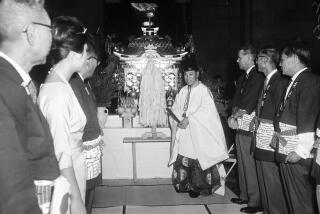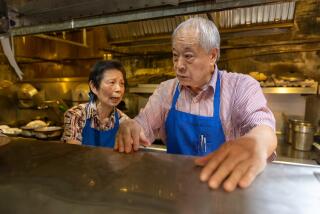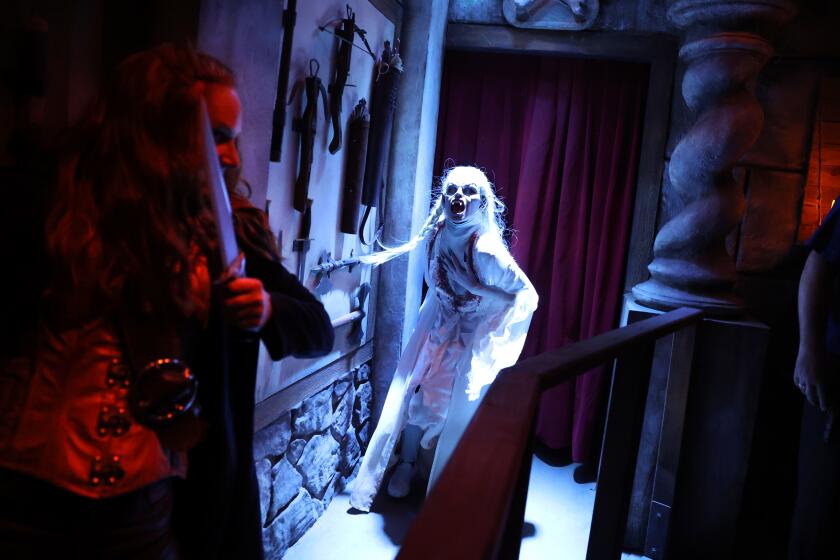Beijing: Forbidden no more
OK, look, we’ve all heard about Beijing being full of cars now instead of bicycles, and about the revolutionary rush to modernity and all that. Yes, within an easy walk of Tiananmen Square, there is a Tiffany’s. Yes, there are 55 Starbucks in Beijing (not to be confused with “55 Days in Peking,” a 1963 flop of a spectacle filmed, naturally, in Spain).
A more subtle change: The hawkers who traditionally pounce on tourists wherever buses unload them are here as they have been, but they’re not only selling postcards, picture books, mini-kites and Rolex knockoffs these days. For a limited time only, they’re hawking unauthorized-edition 2008 Olympics baseball caps.
Welcome to today’s Beijing. It’s not your father’s Beijing. It’s not even your slightly older cousin’s Beijing. Things have changed here so fast, and continue to change, that a favorite pastime is picking a timeframe and adding an astonished (if sometimes assumed) “But now ...”
As in:
Sabine Niehaus, director of sales and marketing for the 700-room Beijing Hotel, came to the capital in the 1990s from Germany.
“When I first came here, it wasn’t a paved road,” she said of the nearby, paved and very bustling shopper’s paradise, Wangfujing Street. “[But now] I can go around the corner and buy a Ferrari.”
Or, on another level, Beijing native Francis Yang, a tour guide:
“When I was a child,” said Yang, 44, “we had nothing. Only a bicycle, a watch and a sewing machine. [But now] I have a car. When I was a child, I couldn’t think about that ...”
What should be reassuring to anyone contemplating a visit is, Beijing -- evolving as it is and even with all the under-construction apartment-block clusters and Ginza-like neon and the succession of freeways that ring the city, and even with the inevitable pre-Olympics signage overkill -- is still Beijing.
You may have to wear blinders from time to time and poke around a bit between the parked Hyundais, but for the moment, at least, it’s still here. It’s also no longer off the beaten tourism path.
Last year, 1.7 million Americans flew into China for a visit, up 10 percent from 2005. The trend appears to be continuing. Why? Partly because that old “Red China” bugaboo has been fading since President Richard Nixon’s 1972 visit de-demonized the country and led us past egg rolls to pot stickers. Partly because we’re doing lots of business in the country (see Mart, Wal).
And partly because here and in other places around the world, maturing and well-off travelers who have been everywhere else are hungry for new destinations, and what better place than one with both a Great Wall and great kung pao chicken?
What’s here to see?
The Great Wall is here. Well, it’s here and it’s in a lot of places, being 4,000 miles long -- but it’s most easily accessible from Beijing, which counts. Closest quality steps are at Badaling (half-day tours, booked through hotels, run about $50 from the capital), a heavily restored section that combines beauty and big crowds, not always a happy combo.
“Ever since I was 12 years old, I’ve had this draw to the Great Wall of China,” said Brett Eisele, at Badaling from Arizona and unable to hide his disappointment. “If I were alone, it would be different. It’s just too many people.
“But it’s something I always wanted to do, and I did, and I have a great fulfillment.”
Offering more isolation, less restoration and ample grandeur, wall access at Mutianyu or Simatai is also within day-tour proximity (rates vary; ask at hotels) but not for the short of breath or unsteady of foot.
The Forbidden City, a vast collection of red walls and pillars and golden-yellow roof tiles, plus statuary, is the city’s essential attraction, some of it 600 years old and the most photogenic symbol of the last emperors. There’s Tiananmen Square, of course; a mechanical sweeper circulates where tanks rattled in 1989.
Lama Temple is here, a favorite of the several surviving temples, which manages a peaceful vibe even when tour groups descend in force. Duck is in Beijing, and you don’t have to order it 24 hours in advance.
And there’s the Peking Opera, or Beijing Opera, or some other variation of the beast, which is on every organized-tour itinerary and guaranteed to stretch Westerners’ capacity for politeness.
“Let’s just say,” said a Syracuse, N.Y., woman after her introduction to the form, with admirable restraint, “it wasn’t my cup of tea.”
The hutongs, the vast, sometimes ancient gray neighborhoods with the little gray houses and tight lanes, aren’t so vast anymore, and redevelopment threatens to turn what’s left into a sort of living museum (like much of the Epcot-ed conversion of Singapore), but plenty are still here. The Back Lakes district remains a neighborhood of bars and good and bad restaurants and tourists being hauled around in leg-powered tri-shaws.
The Hongqiao Pearl Market. Can’t forget the pearl market. Which, as anyone who has had the experience will tell you, is more than a pearl market ...
“Sir? Excuse me. SIR!”
No, thank you.
“SIR? What are you looking for? Tommy Bahama shirt? HELLO?”
No, thank you.
“SIR! Pashmina for your wife? HELLO?”
And another tradition of the post-Deng Xiaoping openness: the well-scrubbed young people, usually female and cute, who will approach you on Tiananmen Square or around the Wangfujing shopping street ...
“Hello?”
Uncertain she’s addressing you, you keep walking.
“Hello?”
Being an American and therefore a nice person, you stop. Hello.
“Where you from?”
U.S.A. And you?
“From China!” Giggles. “Where in U.S.A?”
Chicago.
“Chicago! Windy City!” (There are variations: “Chicago! Michael Jordan!” “Chicago! Chicago Cub!” Evidently no longer fashionable: “Chicago! Bang-Bang!”)
She continues: “On holiday or business?”
Some of these kids, especially with the approaching Summer Games and the related employment opportunities, only want to practice their English with you. And that’s sweet, and it can be fun for everybody.
But chances are, soon after “holiday or business,” you will hear something very close to this:
“I am a student of traditional art and calligraphy on rice paper. We have an exhibition ...”
That’s when you say, Oops, gotta run.
Trust me.
Back to our narrative.
“Shanghai is like your New York,” guides tell Yanks, “and Beijing is like Washington, D.C.” Details aside (more red paint in Beijing, more security barriers in D.C.), the guides have a point: Beijing and Washington, both being national capitals, have more buildings devoted solely to faceless bureaucracy than your average commercial hub like Shanghai, or Chongqing, or Chicago.
But there is also beauty in both capitals (especially now that zillions of trees have been planted all over Beijing to improve the ambience and anchor the soil when the wind blows), plus an undeniable Pride of Nation -- and that’s ultimately what endears these cities to foreigners.
A few survival points about Beijing:
You can do it on your own. Free speech and other “human rights” may be an issue confronting China and the Chinese, but as far as tourists are concerned, there’s nothing stopping you except an admission ticket from strolling around, say, the Forbidden City (admission about $8) with a camera around your neck and Frommer’s in your hand. Think Rome, with fewer purse snatchers. Now, if you go in there and start passing out little New Testaments, that might draw someone’s attention.
Beijing’s public toilets rightfully have been notorious, but guess what? In popular tourist areas, they certainly aren’t the stench bombs they used to be. Nonetheless, carrying your own supply of tissues is still advisable, and women especially should know that “squat” toilets outnumber “Western” ones. (No reason to fret; I have it on good authority that making the adjustment isn’t as daunting as you might fear.) Which leads us to ...
Water. Drink bottled only. That’s what they tell us, even in the cushy new hotels.
Spend a little downtime in a park. Watch the men fly kites and play cards. Watch the kids laugh. Relax.
The subways are clean, easy and cheap. If you’re near a stop and the train goes where you want to go, by all means use it. Stops are announced on the trains in English, and you’ll be able to read the signs.
Your friends may tell you Chinese food in China isn’t as good as you get in the states. Get new friends.
Taxis are metered and inexpensive. You won’t pay much more than $5 to get from your hotel to most of the sights within the tourist zone -- but few drivers understand even basic English. So keep a card from your hotel (it will have its name on it in Chinese) and have someone write your destination in Chinese to hand the driver. One more caveat: For your return to the hotel from certain tourist places (notably the Pearl Market), some drivers will insist on an inflated flat rate. You can bargain (they understand that), but you won’t win. Don’t panic; it’ll just be a couple of bucks. Speaking of bucks ...
Don’t assume shops and vendors will accept U.S. bills, though some might. ATMs that accept U.S. cards are easy to find in Beijing, including at the airport. Credit cards are accepted at places that look like they’d accept credit cards.
English will be spoken by personnel at most hotels, museums (signage is almost always at least bilingual) and at shops that would appeal to tourists. Even if store clerks aren’t fluent enough to debate foreign policy issues, they’ll know their English numbers and such key inquiries as “How much?”
Bargaining is very nearly universal. Even in shops with signs that say “fixed prices,” expect negotiated “discounts.” Big department stores are the exception -- usually.
Language can be a problem in restaurants, though many now have bilingual menus or menus with color pictures; the ones looking for tourist business should have someone who speaks the basics. (What’s that? “Snake.” No.) Be patient with your server, and don’t be shy about pointing out a dish at the next table. They’ll understand and fix you right up. If the situation is hopeless, just smile and shrug and walk out; they’ll be as relieved as you are.
Aside from knockoffs (where you usually get what you pay for) and snacks at street-food stalls (dumplings, noodles, and the like), stuff in China isn’t particularly cheap. That will surprise you. Thank the global economy and the soft dollar.
The Olympic Stadium (a.k.a. The Bird’s Nest) is on the edge of the city, but by Games-time (Aug. 8-24, 2008) will be easily reachable by a light-rail system. It will also be very warm.
And finally:
You will hear warnings from advisers, spoken and written, about springtime dust storms and horrible air pollution. I’m assured by trusted colleagues that those warnings are justified. But in 10 mid-April days in Beijing on this trip, I experienced neither. I’m told that was a fluke.
So come to Beijing, and treat it with the same confident respect you would in other great international cities. You’ll be fine. You’ll be safe. You’ll be surprised. You’ll be well fed.
Oh -- about those fake 2008 Olympics baseball caps: They’ll ask $5. Don’t even think of paying that much.
And, well, don’t wear them in the rain.
Getting there:
Expanded service may be on the way, according to news reports, but for now the only nonstop service between Chicago and Beijing is on United. A recent check found summertime fares around $1,500 (subject to change) for the 13-hour flight; fares in spring and fall, best times to visit, can be hundreds less. (If you’re exploring, United can also fly you into Beijing and out of Shanghai, or vice-versa, for about the same fare.) And If you’re on the West Coast, three Chinese airlines can get you to Beijing and back from there.
Getting around:
Beijing is a decent walking city -- once you get to the neighborhood you want to explore. If your base is near a subway station, trains are efficient, clean and, if you avoid the rush-hour crush, comfortable; most destinations can be reached with a 3-yuan (37-cent) ticket. Otherwise, taxis are inexpensive, with metered fares rarely exceeding $5 to in-town tourist sites. Another option is renting (or even buying, then selling back) a bicycle, but ... no.
Staying there:
The city has hundreds of hotels, with lots more under construction for the 2008 Summer Olympics. Prices listed are for summer; discounts can be major in other seasons, so shop around.
Some of the best hotels, including the snazzy new Westin Financial Street (doubles from $200, this rate and those that follow subject to change and exchange-rate fluctuation; starwoodhotels.com) and the established, conventionish China World ($259; shangri-la.com) are convenient to the city’s scattered financial centers and less convenient for leisure travelers; for simplicity, we concentrated our checks on hotels within walking distance of the Wangfujing Street shopping district and the Forbidden City.
Knockout choice, and near everything, is the Raffles Beijing Hotel ($222; beijing.raffles.com), eye-poppingly refurbished in a French-colonial style. Competitive on the luxury scale and a tad less costly, the neighboring Grand Hotel ($200; grandhotelbeijing.com) is a Frisbee-toss from the Forbidden City. In between the two, the huge (700 rooms), 90-year-old Beijing Hotel ($195) is, well, huge ... and rooms are kind of stodgy, but the location makes it an option.
If the thought of being surrounded by an upscale shopping mall excites you, you’ll adore the gleaming Grand Hyatt ($217; hyatt.com). Smallish “deluxe” rooms at the Peninsula ($250; beijing.peninsula.com) are up to the chain’s high standard, but couples will be happier if they fork up another $25 for an upgrade to the “grand deluxe.”
Two nice, freshened, moderately priced options side-by-side -- the Tianlun Dynasty ($130; tianlunhotel.com) and the Crowne Plaza Wangfujing ($105; crowneplaza.com) -- will please all but the inordinately persnickety.
Rooms on the top four floors of the Novotel Peace ($78; novotel.com), which is across from the Peninsula, have been beautifully renovated, and some have terrific views; unrenovated rooms, the ones on the 15th floor and below, while clean, should be considered only if price is the priority. New hotels are rising near the Olympic Village (a snazzy Crowne Plaza is already there), but they’re on the far edge of all things except the 400-meter hurdles.
Dining there:
The adventurous will want to sniff around the snack street off Wangfujing Street, where shops and stalls serve up noodles, dumplings, and kebabs of exotica (scorpions, other goodies); at night, Donghuamen Street (same general area) breaks out more of the same.
A spiffy sit-down place on that street, Shun Feng specializes in fish fresh from its tanks (my choice: yellow croaker with brown sauce). Across the street, the shredded pork at the Sichuan Restaurant was appropriately mouth-scorching. Window signs at Shuang Lai restaurant, across from the Crowne Plaza, talk of duck (probably to draw hotel guests), but the diced chicken with peanuts and dumplings was nice.
The Uniworld tour brought us to the storied Quanjude Roast Duck Restaurant at its newish Guoman Hotel location, and there was no disappointment. In the Oriental Plaza mall is a restaurant, Xi Shu Duo Hua Zhuang, that serves a souplike sauteed beef, needle mushrooms and rice noodles so screamingly spicy I almost didn’t finish it. But on this trip, the best meal -- shared with friends with a clue -- was in the Ri Tan Park location of Xiao Wang’s Home Restaurant. Order everything. We did.
Information:
On Beijing: Beijing Tourism Administration, english.bjta.gov.cn.
For general information on China: China National Tourist Office Web site, cnto.org.
For visa information, contact the Chinese Consulate General‘s Chicago office, 312-573-3070; chicago.china-consulate.org/eng/.
For information on the 2008 Summer Olympics: en.beijing2008.cn.
More to Read
Sign up for The Wild
We’ll help you find the best places to hike, bike and run, as well as the perfect silent spots for meditation and yoga.
You may occasionally receive promotional content from the Los Angeles Times.






